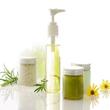
A growing list of celebrities and bloggers criticize the use of chemicals and preservatives in any skincare or beauty products, opting for only “natural” options. But the “natural” ingredients used in beauty products aren’t as well studied as many synthetic ingredients. And there’s actually more evidence that some of them can cause side effects, including sensitivity to the sun and skin irritation. Now that the summer months are upon us, it’s important to educate patients about why these products aren’t necessarily a better option. And for those who choose to use them, following up with an effective SPF is necessary.
Alpha hydroxy acids (AHAs) are a big culprit in this area. While there’s a fair amount of evidence supporting their use for aging skin, products containing these ingredients can increase sun sensitivity and other skin irritations. A growing number of skincare products contain AHAs, so make sure patients understand that proper sun protection is needed when using these products.
Tell patients to also watch out for essential oils, particularly bergamot oil. There’s a fair amount of evidence that using bergamot essential oil topically can increase sun sensitivity. Tea tree oil is also found in a lot of natural skincare products - applying it to the skin might cause skin burning, redness and irritation in some people. And tell patients to watch out for the growing number of products containing papaya - it can cause allergic reactions and skin burning, particularly in people with latex allergies.
Remind patients that skin cancer is the most common type of cancer in the US – using proper skin protection, including a hat and clothes to cover the skin, is the best defense. Using an effective sunscreen daily is also crucial. Make sure to debunk a variety of myths on natural oral sunscreens - they’re actually just a mixture of vitamins, minerals, and antioxidants. They don't have confirmed SPF and should only be used along with topical sunscreens. In general, reinforce that “natural” doesn’t mean better or safer. If patients want to limit their exposure to chemicals, their best bet is to limit the number of beauty and skincare products they regularly use. For example, skipping extras like nail polish or perfume will cut down on overall exposure to synthetic ingredients.
The information in this brief report is intended for informational purposes only, and is meant to help users better understand health concerns. This information should not be interpreted as specific medical advice. Users should consult with a qualified healthcare provider for specific questions regarding therapies, diagnosis and/or health conditions, prior to making therapeutic decisions. Copyright © 2025 NatMed. Commercial distribution or reproduction prohibited. NatMed is the leading provider of high-quality, evidence-based, clinically-relevant information on natural medicine, dietary supplements, herbs, vitamins, minerals, functional foods, diets, complementary practices, CAM modalities, exercises and medical conditions. Monograph sections include interactions with herbs, drugs, foods and labs, contraindications, depletions, dosing, toxicology, adverse effects, pregnancy and lactation data, synonyms, safety and effectiveness.
